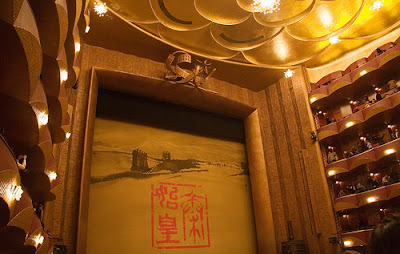Music by Tan Dun
Libretto (in English) by Ha Jin and Tan Dun

Mary Altaffer, AP.
The world premiere of this opera in two acts at the New York Metropolitan Opera on Dec.21, 2006 has generated a lot of (negative) press and blog posts over the last fews weeks.
France Musique (and other radio stations) is broadcasting it live this saturday (Jan. 13) at GMT 18:30 (19:30 Paris time), a good opportunity for each and everyone of us, not living in New York, to discover this new Chinese opera.
Emperor Qin Shi Huang: Plácido Domingo
Princess Yue-yang : Elizabeth Futral
Shaman: Michelle DeYoung
Gao Jian-li : Paul Groves
General Wang: Hao Jiang TianYin
Yang Master: Wu Hsing-Kuo
Tan Dun conducting
The characters are explained here, and the synopsis is here and there.
MET stuff:
A Photo Gallery of Costume and Set Designs for The First Emperor, an interview of Tan Dun.
 Tan Dun
Tan Dun
International Herald tribune review / New York Times review extracts:
By Anthony Tommasini
December 23, 2006
“Still, music drives the theatrical experience of opera, and Tan's score is an enormous disappointment, all the more so because whole stretches of it, and many arresting musical strokes, confirm his gifts.
He [Tan Dun] wanted “The First Emperor to sing, like the Italian operas he and countless other buffs adore.
His music does sing. And sing. And sing. On and on. Whatever the mood of the moment, whether dreamy, defiant, sensual or tragic, as soon as the characters break into song, the melodic lines are inevitably long, arching and slow. Even when the orchestra bustles with intensity, the often cloying vocal lines hovering above still move with almost unvarying deliberateness. In the Italian operas Tan has in mind — say, Puccini's "Turandot" — the pacing of vocal lines accords with the impetuosity of the moment and the flow of the words. Tan's goal in this work, it would seem, was to create a ritualistic and hypnotic lyricism. But "The First Emperor" gives soaring melody a bad name.
The more "The First Emperor" sounds like "Crouching Tiger" the better; the more it sounds like updated "Turandot," the more tedious it becomes."

Washington Post review extracts:
By Philip Kennicott
December 23, 2006
“Musically, Tan's style is heavy on percussive effects, and sometimes novel ones. Chinese instruments round out the ensemble, with Tibetan singing bowls playing a prominent and ethereal role. Western instruments that are capable of sliding, especially the strings, bend pitches in an approximation of micro-tonal ornament.
This grows tiring after a while. The music has coherence, holding together through the recurrence of familiar motifs throughout its long scenes. But it only occasionally rises above the sort of music that opera composers deploy to work their way through text, functional music that gets the storytelling done.
Operas such as "The First Emperor" represent a kind of sidestep, an effort to reappropriate the beloved but shopworn forms of the 19th century, fuse them to something new and exotic and present them as compromise art.
Audiences will likely be pleased to have heard the new opera, but unlikely to return for a second evening. Tan confronts the operatic tradition head on, borrowing from the best, both shamelessly and seriously.”

New Yorker review extracts:
by Alex Ross
Jan.1, 2007
“The opera begins in sensational fashion, with a dynamic ritual of sacrifice. A Peking opera singer invokes the forces of yin and yang in a wailing chant. The chorus shouts, claps, slaps, and stomps. A zheng, or twenty-one-string zither, is savagely strummed; ceramic pots are struck with sticks. A variously blaring, trilling, rustling, and rumbling mass of sound rises up from the orchestra. Across the front of the stage, twelve drummers beat on drums with stones and knock the stones together. It adds up to a strictly organized thunder—and perhaps the most far-out music that has ever been heard at the Met.
The excitement dissipates when Qin walks on, demanding tunefulness in place of raw tradition. The musical language turns prosaic, clichéd, pseudo-Romantic. A few faintly catchy melodic formulas are worked to death. Long stretches of conversation are set to nondescript, tootling music of the kind that plays in movies when naughty pets or children are on the loose.”
Also, the New York Magazine review, Variety review and the Los Angeles Times review.

Blog posts;
Ionarts with an exhaustive list of all the major reviews about this opera, An Unamplified Voice, Out West Arts, Wellsung (who simply walked out of the MET), My favorite intermissions (did the same).
 From Flickr.
From Flickr. Also from Flickr (link to the slideshow).
Also from Flickr (link to the slideshow).




2 comments:
Intéressant à lire. Merci pour ce post.
:)
Post a Comment